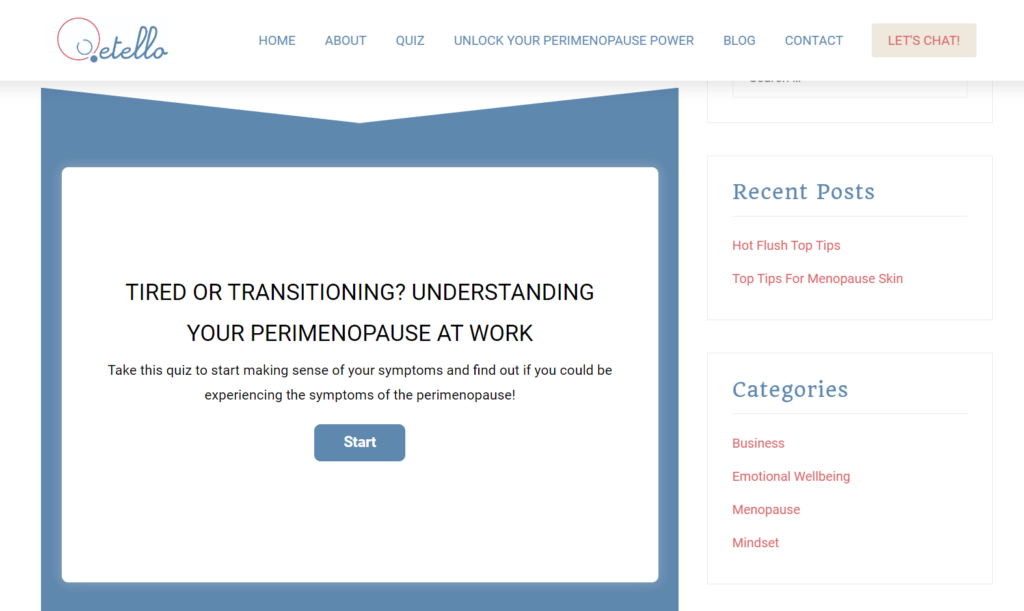What are affirmations?
Simply put, affirmations are positive statements that you consciously repeat to yourself in order to foster a more positive mindset, belief, or attitude.
Often used as a tool for personal development, self-improvement, and building self-confidence; affirmations are typically written in the present tense and are designed to counteract negative thoughts or beliefs by replacing them with positive ones.

The idea behind affirmations is that by consistently affirming positive beliefs or desired outcomes, you can reprogram your subconscious mind, enhance your self-esteem, reduce stress, and manifest your goals.
Affirmations can be used in all aspects of life, and are particularly useful for managing menopausal health, relationships, career, and personal growth.
According to a research study published in 2016:
“Self-affirmations are acts that affirm one’s self-worth, often by having individuals reflect on core values, which may give individuals a broader view of the self. This in turn can allow individuals to move beyond specific threats to self-integrity or self-competence.”
(Steele, 1988; Cohen and Sherman, 2014)
Affirmations and menopause
Menopause can be a time of emotional upheaval with fluctuating hormones and their associated symptoms like hot flashes, mood swings, and insomnia. By using affirmations you can emotionally support yourself by promoting positive self-talk, self-compassion, and resilience. Thus empowering you to navigate through your transition with confidence, ease and joy.
Menopause can also sometimes lead to feelings of loss, or lead to negative attitudes towards your self-image, as you may notice physical changes like weight gain, or in the appearance of skin and perhaps loss of hair.

Using affirmations that emphasise self-acceptance, body positivity, and inner beauty can boost your self-esteem and help you feel more confident and empowered in your body.
Affirmations are proven to help to alleviate stress and anxiety, which are common during menopause. By repeating affirmations focused on calmness, relaxation, and inner peace, you can reduce your stress and anxiety levels, leading to an improved overall sense of health and wellbeing.
Research published in 2009 entitled: “The impact of attitudes towards the menopause on women’s symptom experience: A systematic review” Concluded that:
‘…women with more negative attitudes towards the menopause in general report more symptoms during the menopausal transition.’
(Beverley Ayers, Mark Forshaw, Myra S. Hunter)
What is Self-Talk?
Self-talk is the internal dialogue, or conversations that you have with yourself in your mind. It encompasses the thoughts, beliefs, and interpretations that you make about yourself, others, and the world around you.
Self-talk can be both positive and negative, and significantly influences emotions, behaviours, and overall mental wellbeing.
Being aware of your self-talk is important for personal growth and emotional well-being. By recognising and challenging negative self-talk patterns, you can learn to cultivate a more compassionate and supportive inner dialogue, leading to greater resilience, confidence, and mental health.
Negative Self-Talk -v's - Positive Self-Talk...
Menopause can be a time of emotional upheaval with fluctuating hormones and their associated symptoms like hot flashes, mood swings, and insomnia. By using affirmations you can emotionally support yourself by promoting positive self-talk, self-compassion, and resilience. Thus empowering you to navigate through your transition with confidence, ease and joy.

Menopause can also sometimes lead to feelings of loss, or lead to negative attitudes towards your self-image, as you may notice physical changes like weight gain, or in the appearance of skin and perhaps loss of hair.
Negative self-talk involves critical, pessimistic, or self-defeating thoughts that will undermine your self-confidence and contribute to stress, anxiety, and low mood.
Common forms of negative self-talk include: self-criticism, catastrophising, and magnifying flaws or mistakes.
Examples are self-limiting beliefs could be:
‘I can’t do… x, y, z because…’
- I’m stupid
- I’m not good enough
- I’m not worthy
- I don’t have enough confidence
- I’m too thin or, too fat
BUT, your subconscious mind doesn’t know the difference between what’s really true and what isn’t! If you’re constantly telling your subconscious you’re not good enough, for example, it will happily go off and find evidence to support that belief about yourself.
And why? Well because, the brain is programmed to find ways to confirm what your beliefs are, irrespective of whether that belief is really true or not!
Another example is: ‘I don’t have enough time!’ By telling yourself this, your brain finds ways to confirm this belief and constantly collects evidence to support it and therefore, you feel like you never have enough time!
Whereas, positive self-talk involves affirming, supportive, and constructive thoughts that promote self-confidence, resilience, and optimism. Thus, helping you overcome challenges, build self-esteem, and maintain a positive outlook on life.
Examples of positive self-talk include: encouraging oneself, acknowledging achievements, and reframing setbacks, for example into opportunities to learn and grow.
Some examples of affirmations for menopause include:
- I am capable of handling my menopause with ease.
- I naturally feel good about myself
- I love and approve of myself
- I deserve taking time for myself and giving my body what it needs to be healthy.
- I am calm and confident
- I am amazing at my job
- I lovingly take care of my body
- I calm my thoughts, I am serene
- My skin is glowing and radiant
- I am worthy of love and respect.
- I am capable of achieving my goals.
- I attract success and abundance into my life.
- I am grateful for all the blessings in my life.
- I deserve happiness and fulfilment.
- I embrace the changes I’m going through during this phase of my life.
- I am grateful for this new chapter in my life. I feel strong and empowered.
- I am guided and surrounded by people who love and appreciate me.
By repeating affirmations your subconscious mind will go out and find evidence to support your belief, thus helping you to establish healthy beliefs and behaviours, that work to build your confidence and self-esteem, from which you can create more peace of mind and inner joy.
By focussing the mind on the positive, you can begin to feel grateful for all you are and all you have, generating even more positivity and appreciation for not only yourself, but those around you too!
My Story...
I first started to use affirmations regularly in my early 20’s, when I had cognitive behavioural therapy as part of my treatment for Chronic Fatigue Syndrome. Which, is as much a mental health illness as it is physically debilitating. At this particular time in my life, I was typically an over-achiever with a very limited amount of self-esteem and very negative self-talk.
I suffered from recuring illnesses, like tonsilitis and chest infections and became so exhausted that my body crashed to a point, where I was out of action for around 18 months.

My world crumbled around me, I lost my job, had to leave my part-time degree course and was housebound a lot of the time. When I did start recovering, I had to learn to pace myself, so I wasn’t completely depleting my energy stocks and create a new way of thinking and living.
My therapist recommended I bought Louise Hays book: ‘You Can Heal Your Life.’ It was the first time I’d really heard about the importance of self-talk and come across affirmations – written in a workbook style, it really helped me to see where I could help myself and gave me a sense of empowerment that I didn’t know was possible.
It’s still a book a refer to regularly today for inspiration and reassurance and has literally travelled the globe with me!
Could you be perimenopausal?

Take the Perimenopause Symptom Checker Quiz
If you’re struggling with your mindset, energy or feeling overwhelmed at the moment, then book a breakthrough session with me and let’s identify your key challenges and some strategies to help you!


